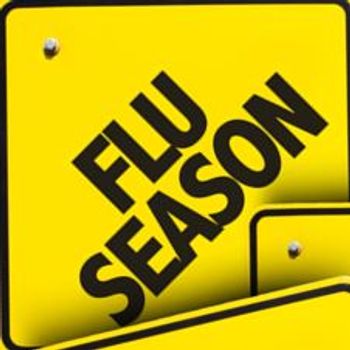
Role Of Patient Education And Empowerment In Vaccination Efforts
Jacinda Abdul-Mutakabbir, PHARMD, MPH, AAHIVP, leads a conversation on the importance of vaccination in the defense and protection against viral infections, such as the flu.
Episodes in this series

John Russell, MD, FAAFP: So, Jacinda, with your interest in vaccines, with your interest in patient education, I'm going to turn to you for this next question. So, can you talk about the importance of vaccination in the defense and protection against viral infections, especially in this case, the flu? And how can we best educate our patients on the importance of getting vaccinated this season?
Jacinda Abdul-Mutakabbir, PharmD, MPH, AAHIVP: Absolutely. Thank you so much for that question, because it's a really good one and honestly, one that I really have to press. I have to press this issue with my patients because at the end of the day, the best way for you to protect yourself against the flu is to receive a vaccine. Vaccines and preventative therapeutics are really just our best mechanisms for getting ahead of these viruses. When we consider influenza, when we consider COVID-19, while we might have these therapies that we can utilize, so say you are infected, we do have packs of it, we have [oseltamivir], we have to think about what's the actual efficacy. We don't see what we need to see for those people that are sick. But when we consider the flu vaccinations, we have 40% to 60% efficacy throughout the flu seasons. So, then we know if you are to get a vaccine, then you're more likely to not be hospitalized, you're more likely not to die. Vaccines prevent over 1.5 million hospitalizations due to influenza. So, it's very important to get them. But also, I want us to press upon and to really think about just how the vaccines are changing with the times. We're becoming better with matching the vaccines to the circulating influenza viruses that we have for each season. So, the better that we get, the more protection that we have. So, I think that that's the best thing to communicate to the patients. But for me, especially as I work in racially and ethnically minoritized communities, another thing that I feel that's necessary to press upon is just the burden of the disease, very particular and very specific to those communities. When I think about the black community for the last 10 flu seasons, black individuals have been 50% less likely to be vaccinated. That means that they've been more representative in those hospitalizations. But even when we consider the development of hospital-acquired infections or multidrug resistant and about antimicrobial infections, because at the root of who I am is an antimicrobial resistance researcher, I'm always thinking about that. Minoritized groups continue to be represented and it's because they're not getting vaccinated. So I think that's also a big thing that we have to tell our patients is, not only do you have these vaccines, not only are we maturing with the times in terms of technology, but also there is a significant burden specific to these communities, specific to these individuals, and we have to make sure that they get out ahead and protect themselves with the best things that we have, which right now are vaccinations.
John Russell, MD, FAAFP: So, our panel really represents all corners of the United States. So, I want to throw it out to the other clinicians, how are you guys tackling some of this education and some of this resistance? Neil?
Neil Skolnik, MD: I'll tell you, John. JAM, the things you said are so important. And really, Wendy, you hit it when you said, “Think back 3 years ago.” It was so easy when we used to say, “I think you need a flu vaccine.” And my patient would say, “Sure.” We'll give it to you at the end of the visit. Great. And that was all it took. And the world has changed. We live in a world now filled with misinformation and vaccine hesitancy. And it is a lot tougher for all of us in primary care now. And one of the things that I'm sure we're going to have a robust discussion about over the course of this is how to counter vaccine hesitancy. But, JAM, I'm so glad you talked about how we are just missing the boat, that we have the opportunity to protect. But that opportunity is often wasted.
John Russell, MD, FAAFP: Wendy, how about in your practice?
Wendy Wright, DNP, ANP-BC, FNP-BC, FAANP, FAAN, FNAP: I totally agree. And, you know, part of me was wondering, why do I have hundreds of flu shots left in my refrigerator this year when I haven't had that in decades? And, so I thought, I'm going to put some of this challenge out to the NPs [nurse practitioners] that I work with. And we actually did a little bit of a game. And I said the highest number of flu shots given out by any nurse practitioner this week gets a $100 gift card. And we did get all the flu vaccines into the arms of our patients. And, you know, I'm willing to do whatever it takes. But it was really, really hard and it was harder than I've ever seen in 31 years. So, I'm not sure. You know, I think it's multifaceted. Right. I think there's a lot of vaccines. As my patients have said to me, “This is my fifth COVID-19 shot. You want me to get a flu and you want me to get an RSV vaccine. And oh, by the way, my tetanus is due and now we've got universal hepatitis B vaccines.” It's a lot out there, particularly for those of us in primary care. So just, again, we just have to really push hard because it's not going to be easier, I don't believe.
Transcript is AI-generated and edited for clarity and readability.
Newsletter
Enhance your clinical practice with the Patient Care newsletter, offering the latest evidence-based guidelines, diagnostic insights, and treatment strategies for primary care physicians.
































































































































